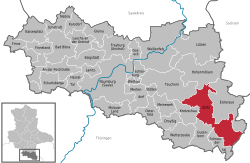Zeitz
| Zeitz | ||
|---|---|---|

|
||
|
||
| Coordinates: 51°2′52″N 12°8′18″E / 51.04778°N 12.13833°ECoordinates: 51°2′52″N 12°8′18″E / 51.04778°N 12.13833°E | ||
| Country | Germany | |
| State | Saxony-Anhalt | |
| District | Burgenlandkreis | |
| Government | ||
| • Mayor | Volkmar Kunze (FDP) | |
| Area | ||
| • Total | 87.15 km2 (33.65 sq mi) | |
| Population (2015-12-31) | ||
| • Total | 29,052 | |
| • Density | 330/km2 (860/sq mi) | |
| Time zone | CET/CEST (UTC+1/+2) | |
| Postal codes | 06711, 06712 | |
| Dialling codes | 03441, 034423, 034426 | |
| Vehicle registration | BLK, HHM, NEB, NMB, WSF, ZZ | |
| Website | German: Stadt Zeitz | |
Zeitz is a town in the Burgenlandkreis district, in Saxony-Anhalt, Germany. It is situated on the river Weiße Elster, in the triangle of the federal states Saxony-Anhalt, Thuringia and Saxony.
Zeitz was first recorded under the name Cici in the synode of Ravenna in 967. Between 965 and 982, it was the chief fortress of the March of Zeitz. Zeitz was a bishop's residence between 968 and 1028, when it was moved to Naumburg. Beginning at the end of the 13th century, the bishops again resided in their castle at Zeitz. The Herrmannsschacht (built in 1889) is one of the oldest brick factories in the world. It was captured by Swedish troops during the Thirty Years' War and was given to Electorate of Saxony in 1644. It was centre of Saxe-Zeitz between 1657 and 1718 before returning to Electorate (Became Kingdom of Saxony in 1806). In 1815, it was given to Kingdom of Prussia and became district (kreis) centre in Merseburg region (regierungsbezirk) of Province of Saxony till 1944, when it became part of Halle region. It became a county free city between 1901 and 1950. It was occupied by USA troops on 27 April 1945 and was given to Soviet ones on 1 July 1945. It was a district centre in Halle region of Saxony-Anhalt state between 1945 and 1952 and again 1990 and 1994 and in Halle bezirk between 1952 and 1990. It lost status centre of county and became part of Burgenlandkreis on 1 July 1994.
A bombing target of the Oil Campaign of World War II, the Brabag plant northeast of Zeitz used lignite coal to synthesize ersatz oil – forced labor was provided by the nearby Wille subcamp of Buchenwald in Rehmsdorf and Gleina.. In the middle of the 1960s work started on the "Zeitz-Ost" residential area, and in the mid-1980s, housing estates such as the "Völkerfreundschaft" (English: International Friendship) were built.
...
Wikipedia



